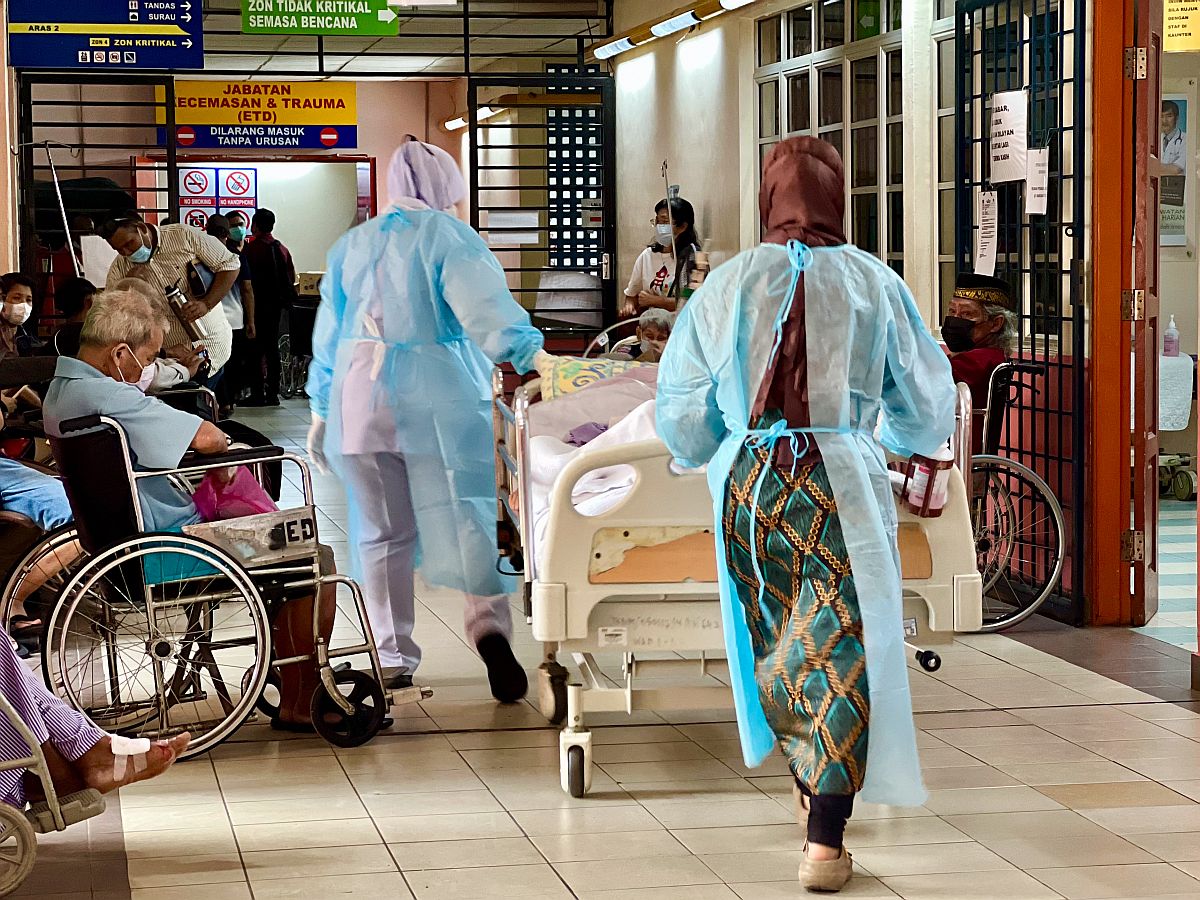MELAKA, July 10 – A “blunder” in the relocation of trained doctors out of Melaka has put the state’s public hospitals and health clinics on alert for a critical staff shortage by end July.
Medical officers currently serving in Melaka and seeking permanent placements reported that none of the state’s public health care facilities – Melaka Hospital, Alor Gajah Hospital, Jasin Hospital, or any of the klinik kesihatan – were listed as available options in the eHousemen system that was implemented in five phases last month, between June 9 and June 24.
This omission has left medical officers in the state with no alternative but to relocate, while their counterparts from other regions were unable to opt for placements in Melaka.
The shocking oversight allegedly stemmed from a critical miscommunication between the Melaka state health department (JKNM) and individual health care facilities under the Ministry of Health (MOH) on the number of permanent positions needed in the public health service in Melaka.
CodeBlue attempted to contact JKNM and the top management of the hospitals cited in this article, as well as the MOH’s federal headquarters in Putrajaya and Health Minister Dr Zaliha Mustafa’s office, to verify doctors’ complaints about the Melaka situation, but none responded at the time of writing.
The latest round of relocation involves over 4,200 medical officers nationwide, including the first cohort of contract doctors enlisted under the MOH’s contract scheme in 2016. Many of these doctors have undergone at least two years of specialised training.
As the end of July approaches, Melaka’s public health care facilities are bracing for a shortage of trained medical practitioners, with personnel set to report to their newly assigned workstations out of the state.
Speaking to CodeBlue on condition of anonymity, a surgeon at Melaka Hospital revealed that the relocation will cause each department within the general hospital to lose around nine to 10 medical officers on average. The hospital’s medical department alone is expected to see 20 medical officers leave, the surgeon said.
“What usually happens during placements is we have medical officers leaving and other medical officers coming in,” said Dr Isaac (pseudonym). “This time, no one is coming in.”
Melaka GH: iFOBT Service Already Suspended, Considering 50% Cut in Elective Surgeries
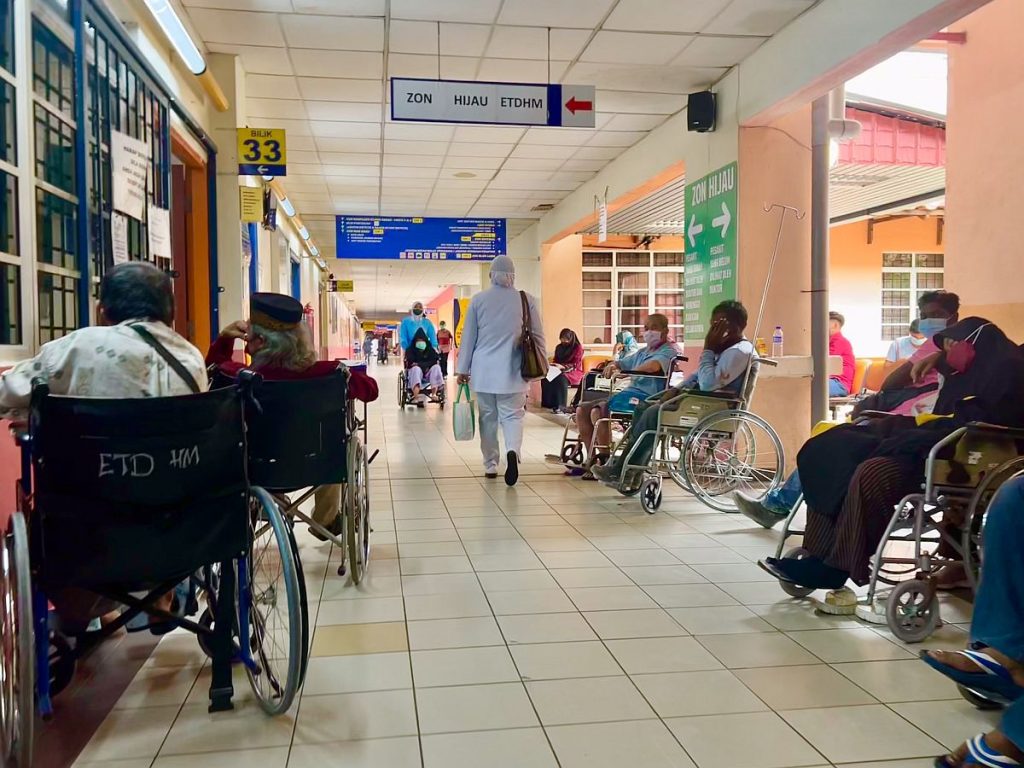
Melaka Hospital has already made the difficult decision to temporarily suspend its iFOBT (immunochemical faecal occult blood test) colorectal cancer screening service.
The general hospital is also considering suspending or halving the number of elective surgeries offered.
“The anaesthesiology department is thinking about cutting down services as there won’t be enough staff to run the operating theatres (OTs), clinics, and intensive care units (ICUs). Anaesthetists support other surgical disciplines like gynaecology, orthopaedics, and general surgery, so any reduction in their services will inevitably impact all surgical disciplines,” Dr Isaac said.
“At the moment, the surgery department has seven OT slots per week. Halving this number means there will only be around three elective OT slots per week, and this will exacerbate the existing backlog. Patients are already facing waiting times of two and a half to three months for certain surgeries.”
Patients under general anaesthesia require the presence of trained personnel for continuous monitoring, making it infeasible to open all OT rooms when there is a lack of staff, Dr Isaac said. The suspension will likely last until trained manpower is replenished.
“We want to avoid penalising patients. Therefore, for cancer patients (colon cancer or breast cancer), like what we did during the Covid pandemic, we will put them on a semi-emergency list. This means whenever an emergency slot becomes available, we will do their surgery.”
Doctors at Melaka Hospital are also considering outsourcing patients to private hospitals like Putra Specialist Hospital, Mahkota Medical Centre, Pantai Hospital Ayer Keroh, and Oriental Melaka Straits Medical Centre, if they can get the budget.
Alor Gajah Hospital: Relocations Will Reduce Staffing to Critical Level
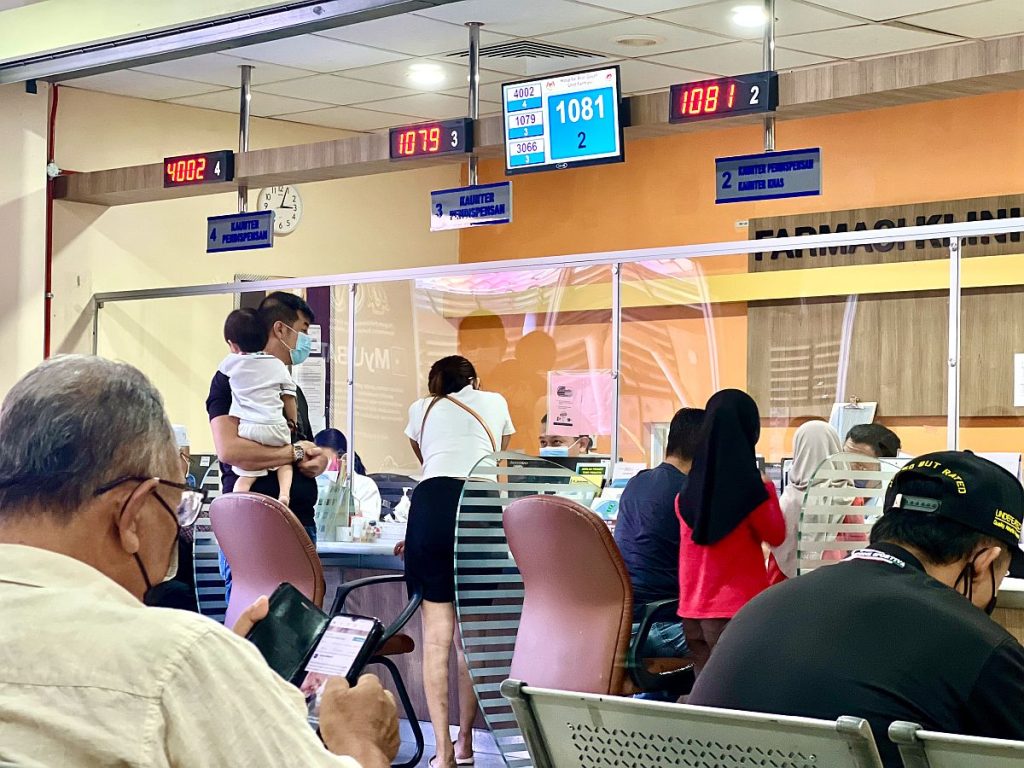
At Alor Gajah Hospital, some 25km north of the Melaka state capital, a total of 11 medical officers are awaiting placements.
Among them, four are in the hospital’s medical unit, three are in multidisciplinary roles, two in general anaesthesia, and two in the emergency and trauma unit.
The district hospital currently runs two full wards, a six-bedded ICU, outpatient clinics, and an increasingly busy emergency unit, said Dr Maya (pseudonym).
“For now, there is no official word on if services at Alor Gajah Hospital will be reduced, but staffing level will definitely be at a critical level if the medical officers leave,” Dr Maya told CodeBlue when contacted.
“If management chooses to maintain existing services, the current team will get overworked and it won’t be long before some will resign or find alternatives because it will be very tiring.”
When Filling Vacancies On Paper Doesn’t Work In Reality
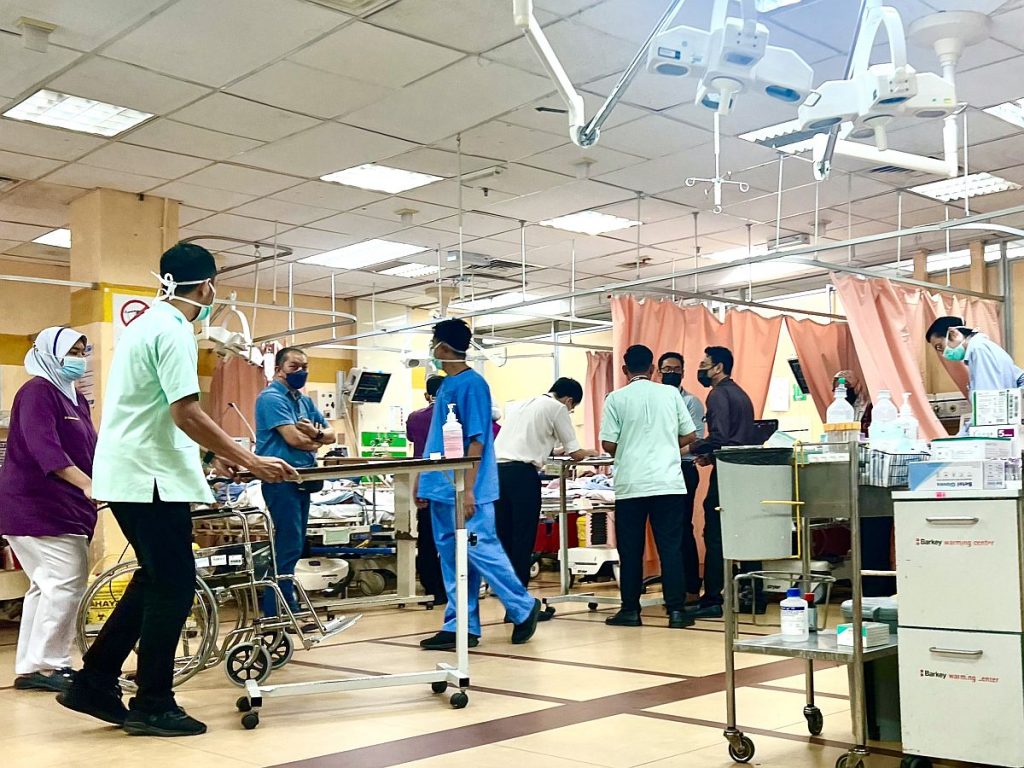
Dr Zaliha previously admitted that the relocation of over 4,200 contract doctors who received permanent positions will cause a temporary shortage of personnel in certain public health care facilities under the MOH.
Her statement came after Hartal Doktor Kontrak (HDK), a contract doctors’ group, raised concerns that the relocation exercise would create an “alarming” void in many departments, hospitals, and clinics.
To tackle this challenge, the MOH has devised a plan to gradually station medical officers who completed their graduate training in affected facilities, starting this month.
Over the course of June to December 2023, a total of 3,226 medical officers are slated to complete their graduate training or compulsory service in stages, the health minister said. The first deployment will involve 675 medical officers this month, followed by 1,150 officers in August.
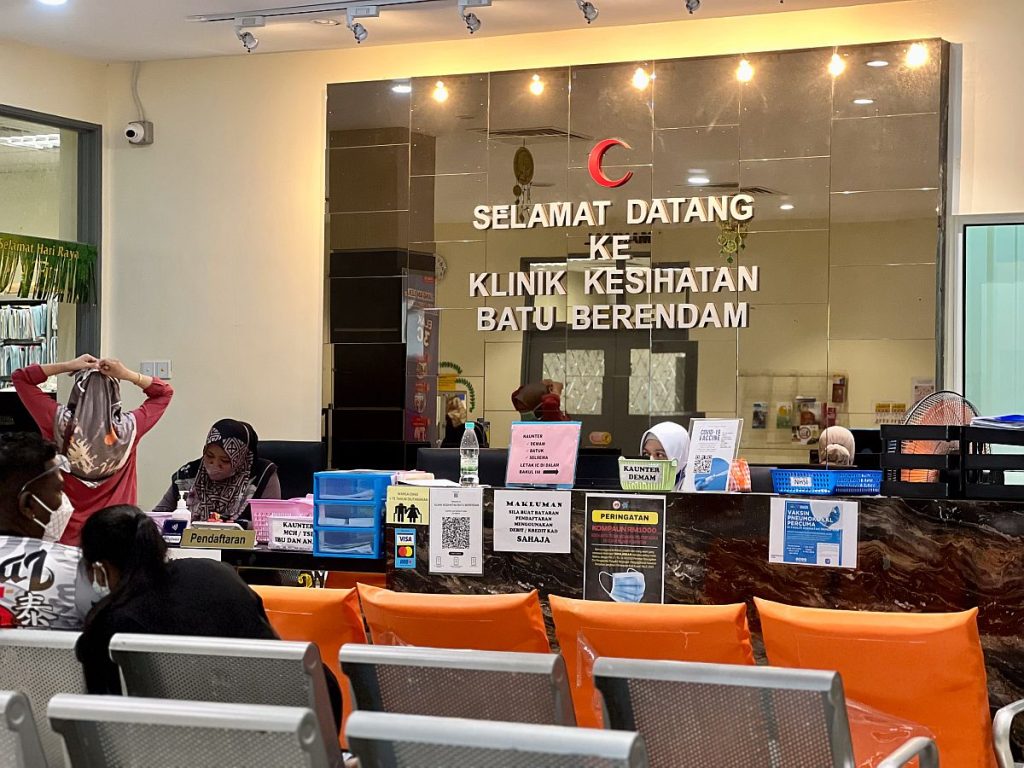
Despite these measures, Dr Isaac said that substituting trained medical officers with those who just completed their housemanship is not an equitable solution. “The main crux is they’ve been trained, and we are losing trained personnel to merely fill vacancies.”
“A UD48 medical officer in surgery or in O&G (obstetrics and gynaecology) is different from a UD48 medical officer in a klinik kesihatan. They are general practitioners who will treat flu, cough, hypertension, diabetes, but they have not been trained to do, for example, appendectomy.
“A UD48 medical officer is quite a senior role and (in surgery), they can do advanced procedures. How can you compare this officer with another who is treating gastritis or hypertension? On paper, they are the same rank, but skill-wise, they are different.”
Dr Isaac highlighted that medical officers under the UD41, UD43/44, UD47/48, UD51/52, and UD53/54 pay grades all fall under the Public Service Department’s (JPA) “Pengurusan dan Profesional” category for medical and health services.
This broad categorisation makes it nearly impossible to distinguish officers’ roles, such as whether they are clinical-based or non-clinical based, or if they are trained or specialised in certain areas.
“As far as the civil service is concerned, they are filling the void, but it’s not the same. There is no way to differentiate medical officers’ roles. If you go down to the department level, then, yes, but for a large-scale exercise like this, where you’re moving people around the whole country, there is no way to differentiate.”
When Senior Doctors Get The Short End Of The Stick
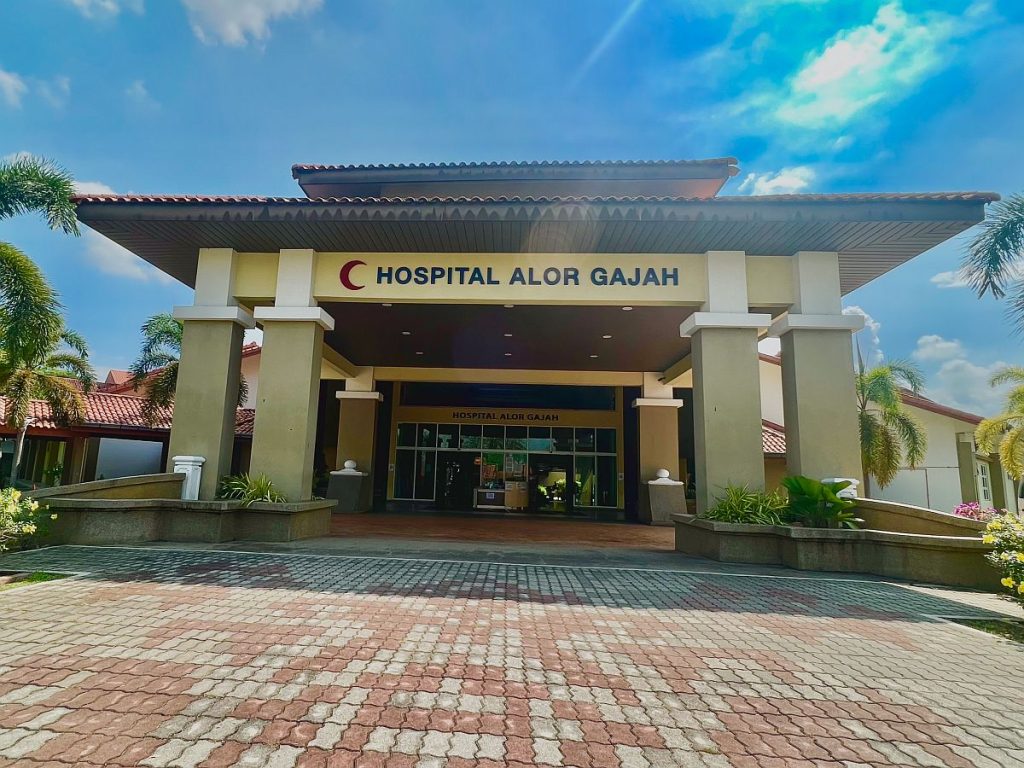
More than 1,000 medical officers involved in the nationwide relocation have appealed to stay in their current location, the health minister said last June 23. Dr Nina (pseudonym) is one of many appealing to stay in Melaka.
The senior doctor explained that the five phases to access the eHousemen system depended on one’s batch; the most senior ones, like Dr Nina, got the first phase, but much fewer slots for placements in tertiary hospitals were made available in the first phase compared to subsequent phases for batches of more junior doctors.
“To my surprise, there were not many slots offered (in the first phase), and most of them were for district or rural facilities like Klinik Desa Bukit Rokan Felda,” Dr Nina told CodeBlue.
“I had hoped to stay in Melaka. But Melaka was nowhere on the list. I then looked at Negeri Sembilan, but there were no tertiary hospitals or district hospitals listed for the state.
“The only options in Negeri Sembilan were rural facilities in areas like Palong and Bukit Rokan. It’s important for me to be in a tertiary setting to specialise.”
Dr Nina added: “Within minutes, all slots in the peninsula were taken up, and the only ones left were in Sabah and Sarawak.”
“I had the impression that new slots might open up the following day, since each phase or batch had three days to access the system. I waited, but there were no changes. The only options left in the system were Sabah and Sarawak, so I had no choice but to settle for whatever was still available. Reluctantly, I selected one of the options in Sabah.
“If you don’t pick anything, it is assumed that you’re not interested in a permanent role.”
When Career Pathways Get Disrupted
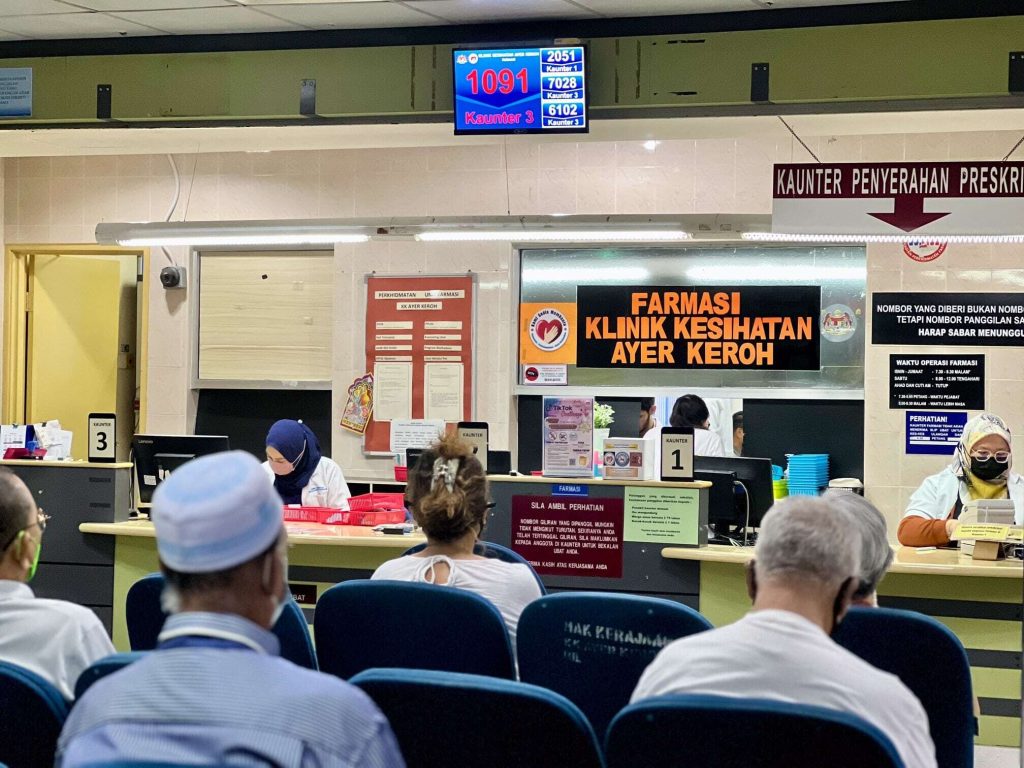
Dr Nina could not hide her disappointment. Her plans to take the Medical Specialist Pre-entrance Examination (MedEx) later this year and applying for the Hadiah Latihan Persekutuan (HLP) scholarship now hang in the balance.
“I’m not sure if it’s still possible now that I’m being assigned to a facility in Sabah,” Dr Nina said.
CodeBlue understands that throughout all five phases of the MOH’s exercise for permanent placements, Melaka was notably absent from the list, while other states such as Selangor and Sarawak did not feature in certain phases.
During the first phase from June 9 to 11, Dr Nina noticed that the only available option in Selangor was Hulu Langat Hospital. She also noticed that only two tertiary hospitals were listed for Kedah in the first phase: Sultanah Bahiyah Hospital in Alor Setar and Sultan Abdul Halim Hospital in Sungai Petani, with merely around 10 slots offered.
Johor had no options for tertiary hospitals, with only district hospitals like Mersing Hospital and Segamat Hospital listed.
Dr Nina later discovered that applicants in the third phase from June 15 to 17 had more options in tertiary health care settings, including 42 slots at the Tengku Ampuan Afzan Hospital (HTAA) in Kuantan, Pahang. According to Dr Nina, the MOH said that the third phase accommodated the largest batch of medical officers offered permanent positions, hence the higher number of available slots.
“I think this is unfair. If they wanted us to compete for a spot, everything should be made available from the start, and we should all have an equal chance to fight for it.”
Dr Nina is now appealing to stay in Melaka. The appeal process involved completing an online Google Form by last June 25. Applicants can state the reason for their appeal, such as pursuing specialised studies, dealing with chronic illnesses, or having immediate family members with chronic conditions. They can also specify their preferred placement location.
Applicants are also required to attach supporting documents, such as a support letter, an offer letter, or the latest medical report on their illness. While many applicants are hopeful, they remain cautious not to set their expectations too high.
When Moving Is ‘A Waste Of Time’
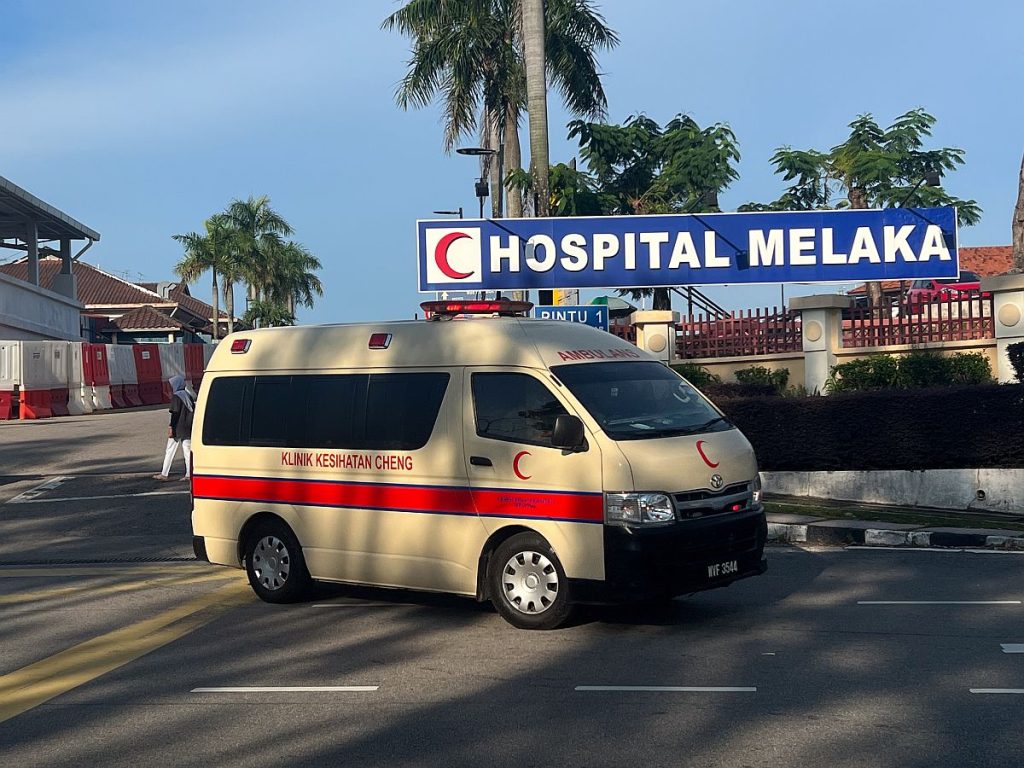
Dr Nadia (pseudonym), a medical officer at Melaka Hospital, is another applicant desperately yearning for her appeal to remain in Melaka to be granted.
Having served nearly two years at Melaka Hospital, where she had opportunities to do surgeries, Dr Nadia had hoped to continue practising in Melaka or, alternatively, to serve near Serdang, Selangor, her hometown.
“To be honest, this is a waste of time to me because we have been training in our desired disciplines. I have always wanted to do surgery, even before my housemanship. Now, I’m not sure if I will have the chance to pursue surgery at the new hospital, and this will mean starting everything all over again,” Dr Nadia said, her voice laden with stress.
With her status in surgery unknown, things are made further complicated, with the latest requirement for basic surgical training necessitating a minimum of three trainers to train trainees.
“To become a trainer, I believe they need a certain number of years in service. I think newly gazetted surgeons who have just obtained their National Specialist Register (NSR) may not be available as trainers; only the more experienced surgeons are eligible.
“Basic surgical training will be a prerequisite for applying for a Master’s programme next year, and I am not sure what situation is in Kluang Hospital,” said Dr Nadia, who has completed MRCS, MedEx, prerequisite courses, and even published papers.
“But the current dilemma is whether I can pursue surgery or not. To me, it’s a big frustration. We are halfway through our training and now, we are forced to move to another place. It feels like a time bomb just dropped. It’s very unfair to everyone.”
Dr Nadia gained access to the eHousemen system during the second phase, which ran from June 12 to 14. Much like Dr Nina’s earlier experience in the first phase, Melaka was not listed, and many options were unavailable.
“The system was incredibly scary. I still remember the adrenaline rush. A lot of locations were not open for selection. Melaka was definitely not there. I thought of going back to Selangor, but the only available option was Tengku Ampuan Rahimah Hospital (HTAR) in Klang, with just 17 slots. I was hoping to get Serdang Hospital or Selayang Hospital, closer to my home. Klang is too far away.
“I don’t recall seeing Seremban either. So, I thought, if Seremban and Melaka are not available, I might as well choose Johor,” Dr Nadia said. “But I think, overall, it’s quite unfair. You can’t open up places based on phases.”
When Things Can Go From Bad To Worse
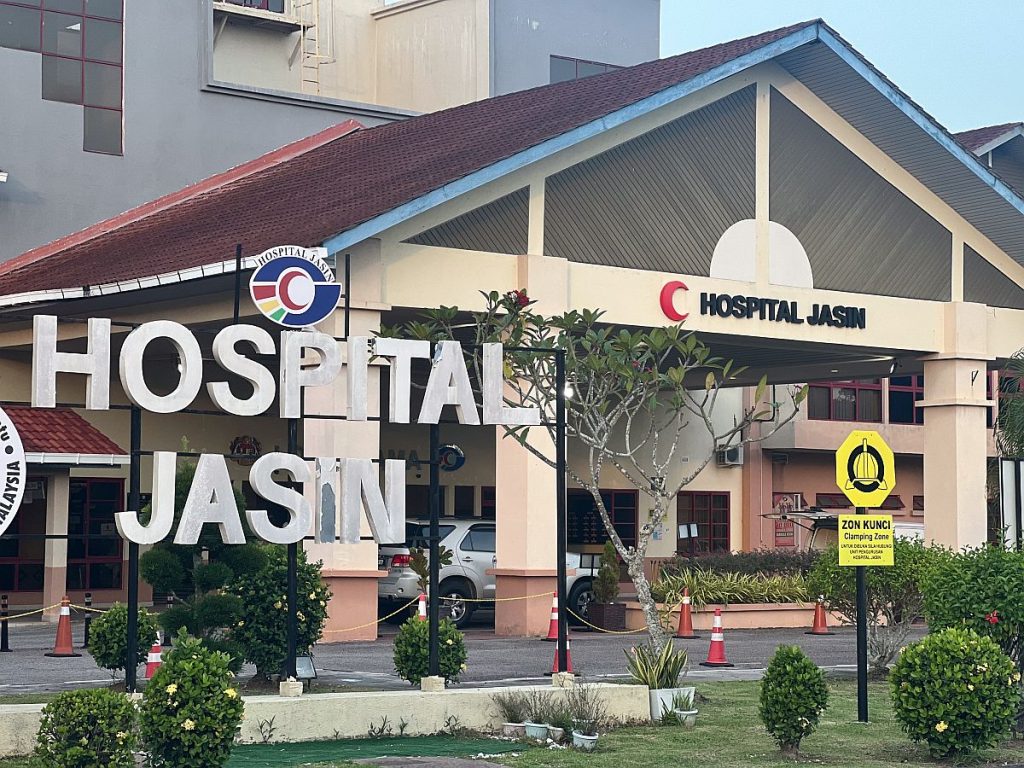
CodeBlue visited six different government health care facilities in Melaka in the last week of June to gain insight into their current situation: Melaka Hospital, Alor Gajah Hospital, Jasin Hospital, and public health clinics in Ayer Keroh, Batu Berendam, and Ayer Molek.
Melaka Hospital’s emergency and trauma department (ETD) resembled that in most major public hospitals – fully occupied, with emergency doctors, nurses, and medical assistants handling multiple patients and tasks at once.
Ongoing renovations compelled wheelchair-bound patients in the Green Zone (non-critical) to temporarily await their turn along the open corridors, beside a drain, instead of a designated space.
Both the Yellow (semi-critical) and Red (critical) Zones in the general hospital were fully occupied, with approximately 10 to 12 patients in each zone. Despite the crowded conditions, emergency personnel appeared to be providing the necessary care and attention to all patients. Notably, patients were allocated hospital beds equipped with proper railings and functional monitors.
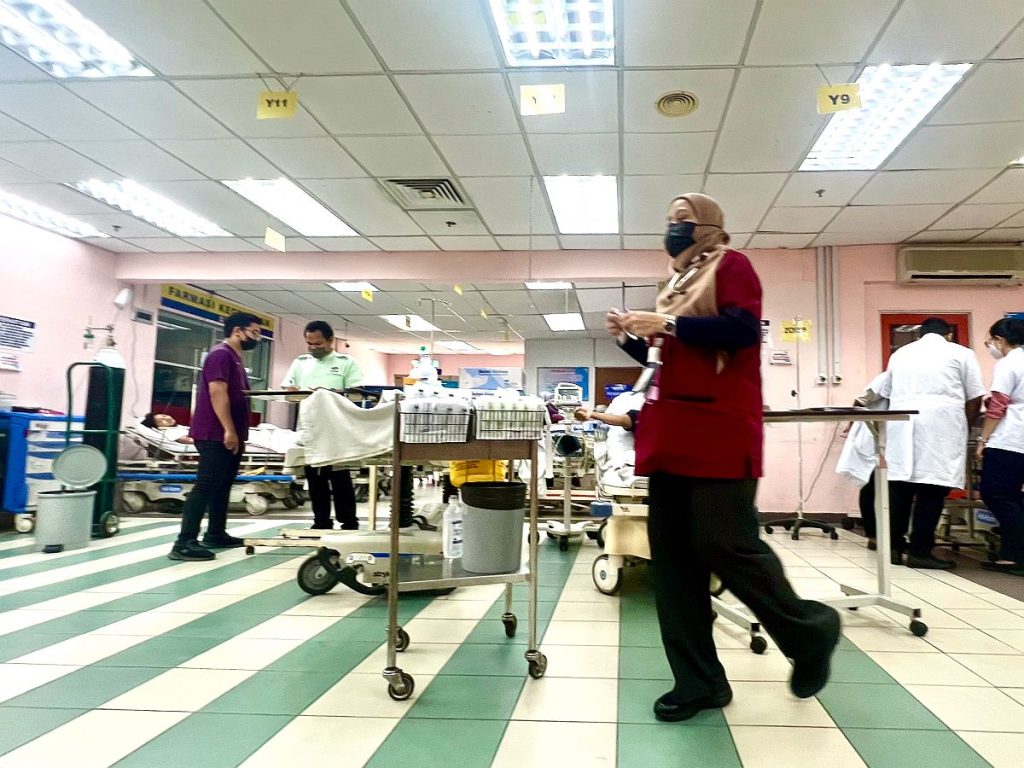
It is worth noting that CodeBlue’s visit to Melaka’s general hospital occurred on a Monday afternoon, a time when most patients had either completed their appointments or settled into wards. “This is actually not bad,” said Dr Isaac, who observed that patient traffic is typically higher in the early morning or evening, after work hours.
During peak hours, Melaka Hospital’s ETD can look “like a refugee camp”, as rows of beds fill up the Yellow and Red Zones.
By noon, wards often reach full capacity, leading to a backlog; medical personnel find themselves compelled to discharge certain patients, sometimes sub-optimally, with drains and tubes still in place.
“Ideally, they should not be discharged, but sometimes we have no choice because we need the beds,” Dr Isaac said.
Melaka Hospital tends to at least 800 patients on a daily basis, with each department attending to around 100 to 200 patients per day. The surgery department alone can sometimes accommodate up to 180 patients in a single morning, Dr Isaac said.
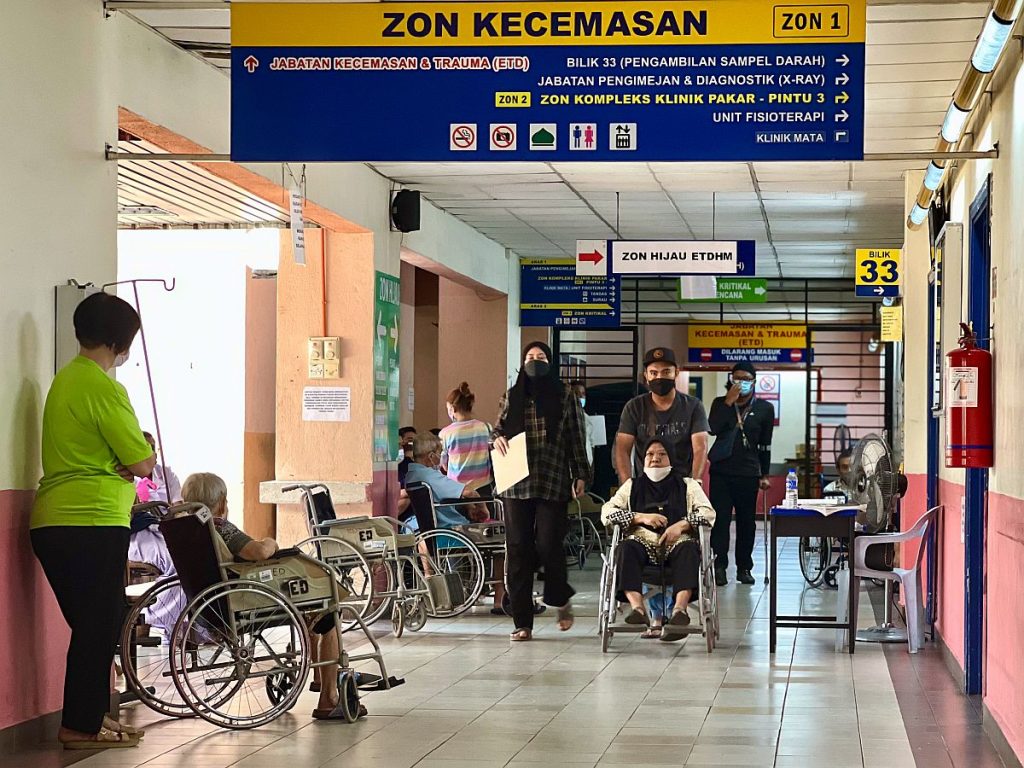
Given the shortage of trained medical officers, coupled with the reduction in services and deferred treatments, patient admissions are anticipated to triple once the relocation comes into effect by the end of the month.
“Even in cases like benign diseases like gallstones, patients can develop complications like infections or jaundice. The stone will not disappear on its own; you need to take it out. But due to the lack of surgical procedures, these patients will suffer complications,” Dr Isaac said.
“So, where will the bottleneck occur? The emergency department. Ideally, we should be able to address the disease before it progresses to complications, so that patients will not go back to the emergency department. But if we don’t sort out the disease, and there are no available elective slots, when complications arise, which they will, then where will these patients go?
“The emergency traffic will start to increase. Patients will come in and clog the system, leading to admissions and emergency surgeries, which is unfavourable for both patients and the health care system.”
Several klinik kesihatan in Melaka’s city centre were also relatively busy, as patients patiently awaited their turns both inside and outside the public health clinic. It is only logical to anticipate that a scarcity of trained personnel in these facilities would result in longer waiting times.
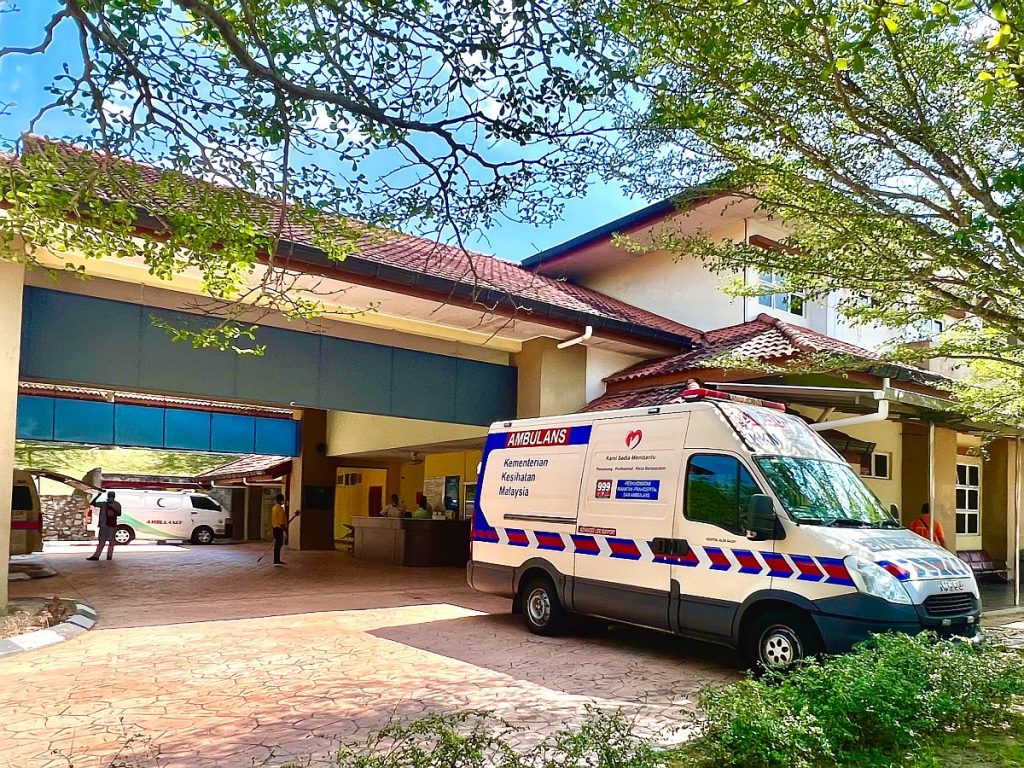
The situation in Alor Gajah Hospital and Jasin Hospital were relatively calm, as the majority of cases typically find their way to Melaka Hospital.
However, Dr Isaac said there had been plans to enhance services at the two district hospitals, particularly in emergency care, that would require certain expertise.
Melaka’s government health care facilities function as a cluster. The two district hospitals often operate as extensions of Melaka Hospital, with resources, including personnel, shared between facilities.
“I really hope that the MOH will consider allowing these trained medical officers, who want to stay in Melaka, to remain where they are. These officers have all appealed and we have submitted a list of people who want to stay, along with their appeal letters, to JKNM,” Dr Isaac said.
“It will be easier for them to stay and wait for further notice, then to move and tarik balik (retract); it will be a mess.”


